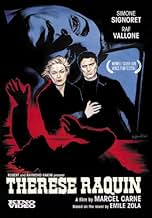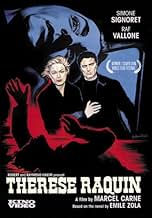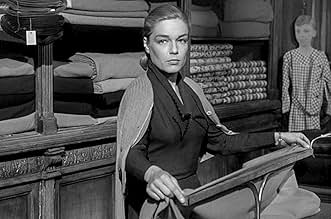VALUTAZIONE IMDb
7,4/10
2022
LA TUA VALUTAZIONE
Un camionista uccide il marito della donna che ama e diventa l'oggetto di minacce.Un camionista uccide il marito della donna che ama e diventa l'oggetto di minacce.Un camionista uccide il marito della donna che ama e diventa l'oggetto di minacce.
- Regia
- Sceneggiatura
- Star
- Premi
- 2 vittorie e 2 candidature totali
Martial Rèbe
- Grivet
- (as Martial Rebe)
Francette Vernillat
- Françoise, la bossue
- (as Françoise Vernillat)
Madeleine Barbulée
- Madame Noblet, une cliente
- (as Madeleine Barbulé)
Recensioni in evidenza
'Thérèse Raquin' (1953) (English title - 'The Adultress') is Marcel Carné's third post-Prévert film. Connoisseur film fans consider it his latest remarkable film. It was produced by the famous Hakim brothers. Even though Jacques Prévert no longer wrote his screenplays and dialogues, Marcel Carné did not give up good literature for this film, and took as inspiration the novel 'Thérèse Raquin', Émile Zola's first great success, a story about passion, crime and punishment in France in the second half of the 19th century. From Zola's (suspenseful in my opinion) story of guilty love and remorse, this adaptation turns into a thriller with elements of film noir. Still suspenseful, of course, but in a completely different genre. It's not a bad movie, but it's a different movie, different from Zola and different from other Marcel Carné movies.
We learn about Therese's fate from dialogues, quite late in the film. The story begins when she is already unhappily married to her cousin Camille, a hypochondriac feeble man caressed by her mother (played by an exceptionally well-composed actress named Sylvie), who terrorizes his young wife. Frustrated from all points of view, Therese seeks refuge in a love affair with a trucker dressed in a leather jacket played by Raf Vallone. The passion of the two inevitably leads to murder, and the murder leads to complications when they are blackmailed by an unexpected witness. It can be said that the film is built of two distinct parts separated by the crime itself committed on the train (here we are dealing again with a change of place, in the novel the deed takes place on water): in the first we witness the suffocating atmosphere in the house the bourgeois family, which builds the premises of the violent act and in the second we follow the consequences of the act filmed in thriller style.
The production is uneven, but it has some beautiful cinematic moments. Simone Signoret is gorgeous both physically and as an actress. Most of us know her from her mature roles and after that - here she is young and fascinating, with eyes whose deep blue we 'see' even though it is a black and white film. The scene of the confrontation with the tyrannical mother-in-law, played only by eyesights (her mother-in-law was paralyzed) is intense and memorable. Raf Vallone, however, is not, in my opinion, up to his partner. The psychological shortcuts of the plot are not sufficiently offset by the elements of suspense in the second part of the film. Paradoxically, Marcel Carné seems more at ease when filming outside, on the streets of post-war Lyon or on the banks of the Rhône. The director, who was to be pushed aside by the younger newcomers of Nouvelle Vague and included in the category of 'cinema du papa', shows that he mastered a few years before them mobility of the camera, framing of the characters on the streets or in nature and direct sound recording. 'Thérèse Raquin' is an interesting film that deserves to be watched or re-watched as a cinematic document, for Simone Signoret, and as a more than acceptable thriller noir. Less, perhaps, for Zola's novel that inspired it.
We learn about Therese's fate from dialogues, quite late in the film. The story begins when she is already unhappily married to her cousin Camille, a hypochondriac feeble man caressed by her mother (played by an exceptionally well-composed actress named Sylvie), who terrorizes his young wife. Frustrated from all points of view, Therese seeks refuge in a love affair with a trucker dressed in a leather jacket played by Raf Vallone. The passion of the two inevitably leads to murder, and the murder leads to complications when they are blackmailed by an unexpected witness. It can be said that the film is built of two distinct parts separated by the crime itself committed on the train (here we are dealing again with a change of place, in the novel the deed takes place on water): in the first we witness the suffocating atmosphere in the house the bourgeois family, which builds the premises of the violent act and in the second we follow the consequences of the act filmed in thriller style.
The production is uneven, but it has some beautiful cinematic moments. Simone Signoret is gorgeous both physically and as an actress. Most of us know her from her mature roles and after that - here she is young and fascinating, with eyes whose deep blue we 'see' even though it is a black and white film. The scene of the confrontation with the tyrannical mother-in-law, played only by eyesights (her mother-in-law was paralyzed) is intense and memorable. Raf Vallone, however, is not, in my opinion, up to his partner. The psychological shortcuts of the plot are not sufficiently offset by the elements of suspense in the second part of the film. Paradoxically, Marcel Carné seems more at ease when filming outside, on the streets of post-war Lyon or on the banks of the Rhône. The director, who was to be pushed aside by the younger newcomers of Nouvelle Vague and included in the category of 'cinema du papa', shows that he mastered a few years before them mobility of the camera, framing of the characters on the streets or in nature and direct sound recording. 'Thérèse Raquin' is an interesting film that deserves to be watched or re-watched as a cinematic document, for Simone Signoret, and as a more than acceptable thriller noir. Less, perhaps, for Zola's novel that inspired it.
Not the best of Marcel Carne by any means but an intelligent, measured if somewhat conventional screen version of Zola's novel, nevertheless. Simone Signoret is "Therese Raquin", the married woman whose affair with truck-driver Raf Vallone leads to murder and blackmail. She is, of course, excellent but this is Vallone's movie; it is an effortless performance of an ordinary man caught up in events over which he has no real control. It's also superbly shot in Lyon by Roger Hubert and the updating to postwar France fits the plot perfectly. In an American setting this could be by James M. Cain though the climatic twist is neater than anything Cain might have given us.
Thérèse Raquin (AKA: The Adultress) is directed by Marcel Carné and Carné co-adapts the screenplay with Charles Spaak from the Émile Zola novel. It stars Simone Signoret, Raf Vallone, Jacques Duby, Maria Pia Casilio and Roland Lesaffre. Music is by Maurice Thiriet and cinematography by Roger Hubert.
Carné reworks Zola's novel to be set in post-war Lyon and slips into a film noir gear. Plot essentially finds Signoret as Raquin, a severely repressed woman stuck in a marriage to her wimpy weasel of a cousin, not only that but she also has to share a home with his domineering mother. Then one day the strapping Laurent LeClaire (Vallone) enters her life, sparking a fiery affair, but as plans for the future are plotted, a turn of events drastically changes everything.
The characterisations are strongly performed, the five principals (Lesaffre arrives late in the play as a key character) giving performances that really draw you into their respective worlds, for better or worse as regards the human condition. Carné skillfully blends the beautiful side of Lyon, such as the quaint cobbled streets and the River Rhone, with a dull bleakness that fogs Thérèse, a woman who has forgotten how to smile, sexual fulfilment a non entity. Hubert also brings his photographic skills to the show, providing some blisteringly gorgeous night shots that offer hope for the new found lovers. But there is a sign post up ahead and it says that the next stop is noirville, and after having spent half the film building his characters, Carné dashes hope and replaces it with misery. Fate plays a big part in the crux aspects of the film, a film noir staple of course, right up to the clinical finale that comes with a thunderous fait accompli.
It's a bit draggy in parts as the director is at pains to show the humdrum side of life, but the change of gear at the mid-point - and the brilliant last quarter, make this a worthy addition for collectors of Frenchie noir. 8/10
Carné reworks Zola's novel to be set in post-war Lyon and slips into a film noir gear. Plot essentially finds Signoret as Raquin, a severely repressed woman stuck in a marriage to her wimpy weasel of a cousin, not only that but she also has to share a home with his domineering mother. Then one day the strapping Laurent LeClaire (Vallone) enters her life, sparking a fiery affair, but as plans for the future are plotted, a turn of events drastically changes everything.
The characterisations are strongly performed, the five principals (Lesaffre arrives late in the play as a key character) giving performances that really draw you into their respective worlds, for better or worse as regards the human condition. Carné skillfully blends the beautiful side of Lyon, such as the quaint cobbled streets and the River Rhone, with a dull bleakness that fogs Thérèse, a woman who has forgotten how to smile, sexual fulfilment a non entity. Hubert also brings his photographic skills to the show, providing some blisteringly gorgeous night shots that offer hope for the new found lovers. But there is a sign post up ahead and it says that the next stop is noirville, and after having spent half the film building his characters, Carné dashes hope and replaces it with misery. Fate plays a big part in the crux aspects of the film, a film noir staple of course, right up to the clinical finale that comes with a thunderous fait accompli.
It's a bit draggy in parts as the director is at pains to show the humdrum side of life, but the change of gear at the mid-point - and the brilliant last quarter, make this a worthy addition for collectors of Frenchie noir. 8/10
Marcel Carné is mostly known for the films he made before the Second World War (such as "Le quai des brumes" (1938) and "Le jour se leve" (1939)), but also in 1953 he is still able to make an excellent film noir (for a change from the country that invented the name of this genre).
The somewhat forgotten Roger Hubert is responsible for the beautiful black and white photography and Simone Signoret plays the femme fatale. I always remember Signoret the way she looked in her later years, her appearance thoroughly neglected, and every time I see a movie from her early days I am amazed how beautiful she ones was.
The film begins rather weak. A young woman is married to a man that is silly in a caricatural way but does have a very attractive friend. There are more subtle ways to indicate that the film will be about adultery.
Over time however the film goes stronger and stronger. The surprising ending nearly equals that of "Diabolique" (1955, Henri Georges Clouzot), also with Simone Signoret. What was most interesting to me however was the middle part, the confrontation between the woman and the mother in law afer the dead of the husband. In reality these confrontations are confrontations of the woman with her own conscience. This part of the film resonates the work of writers as Poe and Dostojevski.
To conclude, something for the real filmbuffs. Maria Pia Casilio plays a tiny part as chambermaid in a hotel. From the first second I saw her I thought "I know that girl, she plays Maria in "Umberto D" (1952, Vittorio de Sica)". A little investigation proved that I was right, so I can count myself as a filmbuff.
The somewhat forgotten Roger Hubert is responsible for the beautiful black and white photography and Simone Signoret plays the femme fatale. I always remember Signoret the way she looked in her later years, her appearance thoroughly neglected, and every time I see a movie from her early days I am amazed how beautiful she ones was.
The film begins rather weak. A young woman is married to a man that is silly in a caricatural way but does have a very attractive friend. There are more subtle ways to indicate that the film will be about adultery.
Over time however the film goes stronger and stronger. The surprising ending nearly equals that of "Diabolique" (1955, Henri Georges Clouzot), also with Simone Signoret. What was most interesting to me however was the middle part, the confrontation between the woman and the mother in law afer the dead of the husband. In reality these confrontations are confrontations of the woman with her own conscience. This part of the film resonates the work of writers as Poe and Dostojevski.
To conclude, something for the real filmbuffs. Maria Pia Casilio plays a tiny part as chambermaid in a hotel. From the first second I saw her I thought "I know that girl, she plays Maria in "Umberto D" (1952, Vittorio de Sica)". A little investigation proved that I was right, so I can count myself as a filmbuff.
Emile Zola wrote page turners. He focused on the injustices of the great unwashed of France, from miners to prostitutes. His books were incredibly naturalistic and moralistic. His characters seldom came through unscathed but made a statement about the cultural milieu of the time. This is a story about passion. Therese Raquin is the wife of a tiresome mama's boy hypochondriac. She is beautiful and is married to this childish wimp. Along comes the handsome truck driver after she has spent six empty years with this guy. They have tryst and even let the husband know that he is going to lose his wife. Everything changes when, on a train trip to Paris, fate takes over. Granted, there are lots of plot contrivances, but that's the literary style of the period. Also, in the naturalist tradition, the characters often lose control of their destinies. There is a broader moral sense that trumps the likable ending that people are used to in movies made at this time. The writer and the director can't turn their backs on issues like these and so life goes on and the impulsive and evil are punished alike.
Lo sapevi?
- QuizRaf Vallone refused to be dubbed in the French version and had his contract amended accordingly. The scenario was also slightly changed to "Italianize" the character of Laurent.
- ConnessioniFeatured in Mémoires pour Simone (1986)
I più visti
Accedi per valutare e creare un elenco di titoli salvati per ottenere consigli personalizzati
- How long is The Adultress?Powered by Alexa
Dettagli
- Tempo di esecuzione1 ora 42 minuti
- Colore
- Proporzioni
- 1.37 : 1
Contribuisci a questa pagina
Suggerisci una modifica o aggiungi i contenuti mancanti

Divario superiore
By what name was Teresa Raquin (1953) officially released in India in English?
Rispondi


























